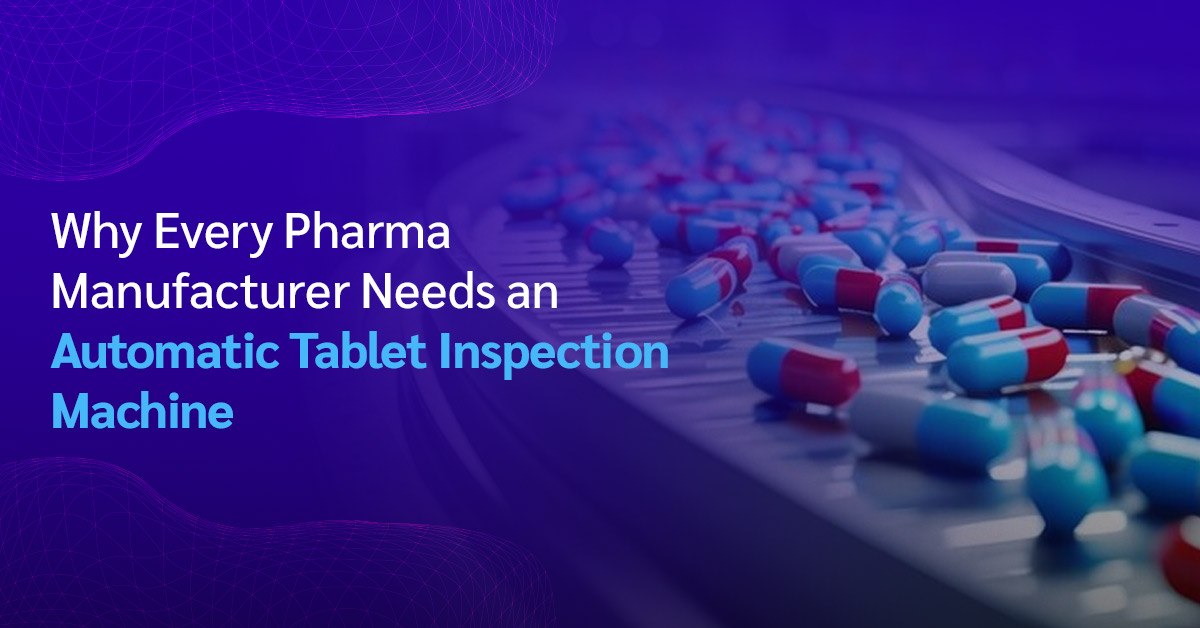In the pharmaceutical industry, precision, quality, and compliance are non-negotiable. Even the slightest deviation in tablet size, shape, or composition can have severe consequences, affecting both patient safety and regulatory compliance. This is where Automatic Tablet Inspection Machines (ATIMs) play a crucial role in modern pharmaceutical manufacturing. Here’s why every pharma manufacturer should invest in this technology.
- Ensuring Uncompromised Quality
Manual inspection methods are prone to human error and inefficiencies. ATIMs use advanced vision systems, AI, and high-speed cameras to detect defects such as:
- Size and shape deviations
- Surface cracks and contamination
- Coating inconsistencies
- Colour variations by automating the inspection process, manufacturers can achieve near-perfect quality control, ensuring that only defect-free tablets reach the market.
- Enhancing Regulatory Compliance
Pharmaceutical manufacturers must adhere to stringent regulations, such as FDA, EU-GMP, and WHO guidelines. Non-compliance can lead to recalls, fines, and reputational damage. ATIMs help manufacturers maintain compliance by:
- Providing digital records and audit trails
- Ensuring batch consistency
- Reducing human intervention in quality checks Automated inspections offer traceability and real-time monitoring, making regulatory audits smoother and more efficient.
- Increasing Operational Efficiency
Manual inspection is time-consuming and requires a skilled workforce. ATIMs significantly enhance efficiency by:
- Performing high-speed inspections (up to 100,000 tablets per hour)
- Reducing labour costs and dependency on manual operators
- Eliminating bottlenecks in production lines by integrating ATIMs into their operations, manufacturers can scale production while maintaining stringent quality standards.
- Reducing Product Recalls and Wastage
Product recalls due to quality issues can be costly and damaging to a company’s reputation. ATIMs minimize recalls by detecting defects early in the production process. Additionally, by reducing false rejections, these machines help optimize yield and reduce wastage, ensuring maximum resource utilization.
- Integration with Industry 4.0 and IoT
With the rise of Industry 4.0, smart manufacturing is becoming the norm. ATIMs can seamlessly integrate with IoT-based manufacturing systems, enabling real-time data collection, predictive maintenance, and remote monitoring. This connectivity not only improves efficiency but also enhances decision-making through data-driven insights, ensuring continuous process improvements.
- Competitive Advantage in the Global Market
In an increasingly competitive pharmaceutical landscape, ensuring consistent product quality can be a key differentiator. Companies that invest in advanced automation, such as ATIMs, gain a competitive edge by delivering superior products with fewer defects. This can enhance brand reputation, improve customer trust, and open new business opportunities in regulated markets.
End Note:
For pharmaceutical manufacturers striving for excellence in quality, compliance, and efficiency, Automatic Tablet Inspection Machines are no longer optional—they are essential. Investing in ATIMs not only enhances product quality and regulatory adherence but also optimizes operations and reduces risks associated with defects and recalls.
Embracing automation in tablet inspection is a step toward a smarter, safer, and more efficient pharmaceutical manufacturing process. Are you ready to take your quality control to the next level?
Contact us today at marketing marketing@jeksonvision.com or WhatsApp us at +91 6352 529 570 and discover how Jekson Vision can help you gain visibility, achieve control, and unlock the full potential of your business.







